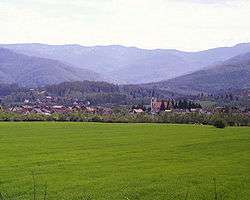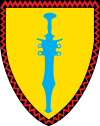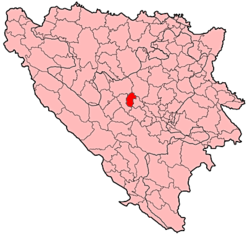Vitez
Vitez is a city and municipality located in Central Bosnia Canton of the Federation of Bosnia and Herzegovina, an entity of Bosnia and Herzegovina.
Vitez Витез | |
|---|---|
| Grad Vitez City of Vitez | |
 Vitez | |
 Flag  Coat of arms | |
 Location of Vitez within Bosnia and Herzegovina | |
| Country | Bosnia and Herzegovina |
| Government | |
| • Mayor | Tomislav Bošnjak-Matić (HDZ BiH) |
| Area | |
| • Total | 159 km2 (61 sq mi) |
| Population (2013 census) | |
| • Total | 25,836 |
| • Density | 170/km2 (400/sq mi) |
| Time zone | UTC+1 (CET) |
| • Summer (DST) | UTC+2 (CEST) |
| Area code(s) | +387 30 |
| Website | http://www.opcinavitez.info/ |
Name
The word "vitez" literally means knight in the South Slavic languages, Croatian; Bosnian; Serbian; and Macedonian, it is also used in Hungarian. The Russian cognate is Vityaz.
History
The first settlements belonged to the "Butmir Culture". One of the most famous artifacts found from that age in Veliki Mošunj, is a "Big Bronze Sword", uniquely crafted. During Roman time, the first urban settlements are being built. Through the river Lašva valley there were communication routes in which the caravans, armies, missionaries, etc. used to travel.
On Castoriusovoj Tabuli Peutingeriani, there were caravan routes from which the important one goes through this valley to connect Pannonia in the north to Aegnatia at the south. U lower levels of the valley there were findings and lots of tombs, foundations, ... According to excavated articles from the middle age significant findings are discovered in Zabilje, Počulica, Kremenik, Gačice, Večeriska, Preočica, etc.. During Big Migration in Europe, caused by the decay of Roman Empire, in this region the Slavs begin to come from nowadays Ukraine and Poland, and are organizing their first states. At nearby Bilino Polje (Zenica) the great Bosnian ruler Kulin Ban left the Charter of Ban Kulin, the oldest written document of all South Slavic states, 29 August 1189, written in Bosančica (Old Bosnian Alphabet). In the time of Ban Stjepan Kotromanić there was a census in which old Bosnia had seven counties.
It is also known that Vitez was part of Bosnia until the decay of Bosnia when Ottoman Empire occupied this region. This was the period in Vitez got its name. It is known that the first settlement in nowadays urban area was formed around the mosque, built in 1590. Knowing that mosques are being erected in urban areas, it is logical to say that this settlement existed even before. Vitez is mentioned once again during an uprising against Turks led by Husein Gradaščević, when he defeated Turkish Army at Kosovo, after which he was named for Bosnian de facto ruler (Vezir). According to the Austrian officer Božića (1785), Vitez had 18 houses, mosque and Motel (Han).
After many centuries under the Ottoman rule, 1878 Bosnia and Herzegovina, and Vitez got occupied by Austro-Hungary Monarchy, and later 1908 annexed. During this time there were many changes in Bosnian society, both political and economical. For a short period they built many roads, railroads, mines,... But, unluckily only with goal to exploit Bosnian natural resources. At the place of old Turkish wood plant, Austrian entrepreneur Guido Rütgers built the enterprise for mechanical wood processing which was a milestone in a development of urban area. In 1879. Vitez had 510 inhabitants. Other companies existed as well, but were all owned by foreigners. It this period many people from parts of Monarchy came to work in Vitez, especially from Slovenia, Croatia, Czechoslovakia, Hungary, Switzerland.
Demographics
| Municipality | Nationality | Total | |||||||||
|---|---|---|---|---|---|---|---|---|---|---|---|
Bosniaks |
% |
Croats |
% |
Serbs |
% |
Yugoslavs |
% |
others and unknown |
% | ||
| 1971 (municipality) | 8,527 | 41,33 | 10,196 | 49.42 | 1,502 | 7.28 | 178 | 0.86 | 225 | 1.11 | 20,628 |
| 1991 (town)[1] | 2,647 | 36.20 | 2,607 | 36.20 | 741 | 10.29 | 937 | 13.01 | 268 | 3.72 | 7,200 |
| 1991 (municipality)[1] | 11,514 | 41.32 | 12,675 | 45.49 | 1,501 | 5.38 | 1,377 | 4.94 | 792 | 2.87 | 27,859 |
| 2013 (municipality)[2] | 10,513 | 40.69 | 14,350 | 55.54 | 333 | 1.28 | 25,836 | ||||
Sport
The town is home to the football club NK Vitez, basketball club HKK Vitez Paladij, handball club R.K. Vitez, table tennis clubs STK Vitez and STK CM Vitez, and rugby league club Vitez RLC.
Notable people
- Davor Badrov, singer
- Sasha Skenderija, poet
- Zlatan Bajramović, footballer
- Vejsil Varupa, footballer
- Ante Rajković, footballer
- Roberto Soldić, KSW fighter
References
- Official results from the book: Ethnic composition of Bosnia-Herzegovina population, by municipalities and settlements, 1991. census, Zavod za statistiku Bosne i Hercegovine - Bilten no.234, Sarajevo 1991.
- Link text, additional text.
External links
- http://www.vitez.info/
- https://web.archive.org/web/20110202144330/http://vitezani.com/
- http://www.nisvethrustic.com
- https://web.archive.org/web/20070705083615/http://www.vitezani.com/
- http://www.fis-bih.com
- http://www.ambyenta.com
- http://www.gsbih.com
- http://www.eko-fis.ba
- http://www.anbinni.ba
- http://www.am2000vitez.com
| Wikimedia Commons has media related to Vitez. |